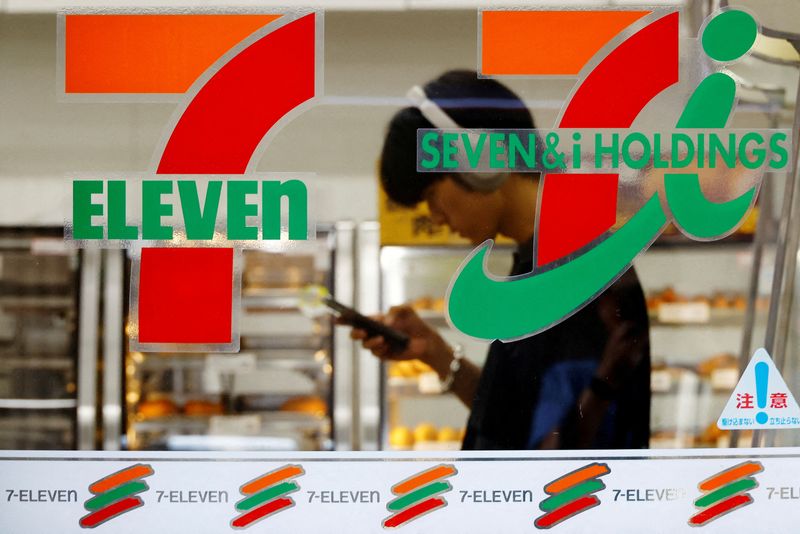By Rocky Swift and Maki Shiraki
TOKYO (Reuters) -Seven & i Holdings turned the humble 7-Eleven store into a popular food destination in Japan by serving up fresh sandwiches, rice balls and rows of boxed lunches, changing how millions of people eat.
Five decades after it opened the first store in its home market, the company is on a mission to bring some of its most popular items to the U.S. - a strategy enthusiasts don't want to see endangered by a takeover bid from Canada's Alimentation Couche-Tard.
Couche-Tard, owner of Circle-K convenience stores, has sounded out Seven & i - which has a market value of $36 billion - about a possible acquisition, the companies said this week. A potential deal value hasn't been disclosed and there's no guarantee a transaction will happen.
Analysts and industry experts believe Couche-Tard is interested in synergies in North America, where Seven & i has more than 15,000 convenience stores and gas stations, albeit far less profitable than the firm's Japanese stores or "conbini" which number some 21,000.
"The food quality is much higher, and more unique" at Japanese 7-Eleven stores than in the U.S., said New York-based food influencer Jeremy Jacobowitz, who has more than 500,000 followers on Instagram.
"It makes me nervous that they will mess with what I deem perfection," he said about a possible buyout. Jacobowitz said he doesn't receive financial consideration from Seven & i.
At its Japanese conbini, Seven & i boasts a 27% operating profit margin, according to LSEG data. But at its overseas convenience stores, the figure is just 3.5%.
Seeing fresh food as key to fixing low U.S. profitability, Seven & i said this year it is introducing more than 200 food items in its U.S. stores - some of them distinctly Japanese - a strategy that has been enthusiastically received by fans on social media and food-related websites.
Much of that plan hinges on plants run by Japanese firm Warabeya Nichiyo Holdings, in which a Seven & i unit is the top shareholder.
In Texas, it will produce "onigiri" rice balls and "Lone Star Sliders". In Virginia, it will roll out Japanese-style sandwiches that use thin and slightly sweet white bread as well as chicken curry rice bowls.
FOOD-DRIVEN GROWTH
Conbini have become an essential part of everyday life in Japan, where people pay bills, send packages and pick up concert tickets. But it is the food that has been the main driver of growth.
Stores get multiple daily deliveries of sandwiches, onigiris, and pre-cooked meals aimed at consumers too busy to cook. They also stock fresh fruit, including bananas and individual packets of peeled and sliced apple, as well as bread and pastries.
One recent innovation at 7-Eleven in Japan: the introduction of fresher-tasting bread in stores by using a new defrosting process on bread frozen at the factory.
"What Seven & i did to make convenience stores work was logistics," said Michael Causton, the co-founder of retail research firm JapanConsuming.
For the last 24 years, Seven & i has been the highest-selling retailer in Japan, he said, although it faces stiff competition from convenience store rivals such as Lawson and FamilyMart.
By contrast, foreign retailers have had a poor track record in making inroads in Japan, one of the world's toughest consumer markets and analysts wonder what Couche-Tard can bring to the table in Seven & i's home market.
"The United States is the world's biggest market and that's where the synergies will be the easiest to achieve," said Shun Tanaka, a senior analyst at SBI Securities. "But I don't think Couche-Tard knows anything about running Japanese convenience stores."
TEXAS TO TOKYO
Previously called Ito-Yokado, Seven & i was founded by Masatoshi Ito, who rapidly expanded it in the postwar era. In 1973 it licensed the 7-Eleven franchise from Dallas-based Southland Corp and a year later opened the first 7-Eleven in Tokyo.
When Southland went bankrupt, the Japanese company took it over in 1991 and now controls more than 80,000 7-Eleven stores worldwide.
Seven & i's Japanese businesses include supermarkets, big-box "superstores" and a bank. It also operates Denny's (NASDAQ:DENN) restaurants and Tower Records.
It has been targeted by activist shareholders, most recently ValueAct Capital, for what they say is unnecessary bloat.
Founder Ito was seen as long against hiving off units.
Following his death last year at age 98, Seven & i exited its apparel business and closed dozens of Ito-Yokado outlets, making plans to spin off the rest.

Couche-Tard could look to allow the Japanese business to operate independently, said James Halse, co-founder of Senjin Capital, a Sydney-based, Japan-focused fund.
"Probably the main reason they want Seven & i is for the exposure of the U.S. gas station business," he said.